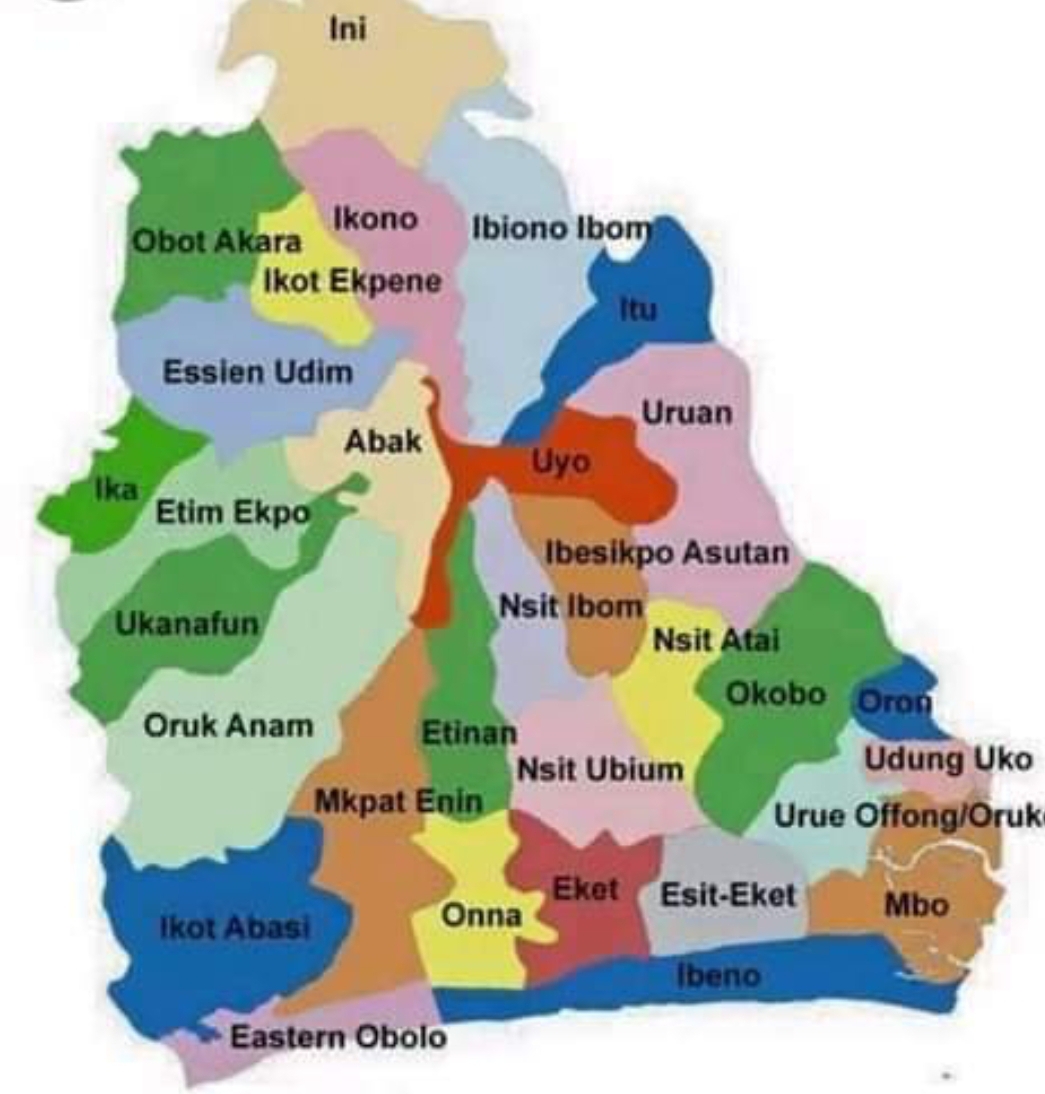By Enobong Ukpong:
OVERVIEW
Akwa Ibom State was hailed as the “Land of Promise,” ready to address persistent development issues for its people when it was founded in 1987. It was very apparent what was expected: quick infrastructure development and higher living standards through efficient use of natural and human resources in plenty.
The industrial sector, which took over a number of failing industries from the former Cross River State, was crucial to this strategy. The dream is still mostly unfulfilled even after several industrialization projects have been launched by succeeding governments.
This study offers a critical evaluation of Akwa Ibom State’s industrial projects from the outset, emphasizing earlier commitments and suggesting a renewed emphasis on pre-existing plans for sustainable development.
INTRODUCTION
Industry, which includes manufacturing, mining, quarrying and construction is very important because it produces goods and services that are crucial for the well-being of a society. Upon creation in 1987, Akwa Ibom State inherited ten state-owned industrial establishments from its parent state Cross River State although many were in decadence (Ukpong and Iniodu, 1994). The economy of the state encompasses both public and private sectors with a historical bias toward public service and government-sponsored initiatives. Nonetheless, attempts to privatize and commercialize industries have been unable to stir substantial private sector
I. INDUSTRIAL GROWTH.
A. Introduction
Historically, industrial activities in what is now Akwa Ibom State date back to the pre-independence era, basically driven by palm produce as a major export of the area. Nevertheless, over the years that followed, neglect has seen many mills and factories rot into obsolescence becoming relics of an industrial era gone since long ago. By mid-1970s and early 1980s, imported technology dominated the few manufacturing ventures established which produced goods ranging from drinks to ceramics having little local inputs (Dike, 1997). Besides this, there were challenges such as raw material shortages that further hampered industrial sustainability (Akpabio, 1991).
B. Review Of Various Administrations’ Efforts At Modernising The Industrial Sector Through Revitalization:
Despite some efforts made by various administrations to resuscitate and modernize the industry through initiatives like rejuvenation, privatization and commercialization; sustained commitment has been inconsistent (Sako & Ogunlana; 2008). In this regard, this paper looks at how far Akwa Ibom has gone with its industrialisation attempts focusing on the need for a renewed commitment using existing frameworks for a meaningful industrial growth resulting in economic development.
UNDERSTANDING INDUSTRIALIZATION
To put it simply, industrialization is the process of utilizing machinery to transform commercial and productive organizations. For the sake of a more thorough explanation, industrialization refers to all of the technological procedures that a community needs go through in order to experience a consistent rise in productivity. We might examine the concept offered by Abba and his associates in 1985 to go farther. Industrialization is defined as the process by which a nation gains the ability to direct and oversee its whole industrial production cycle. This covers the manufacturing of tools and machinery needed for manufacturing, the development of skills necessary to run, maintain, and innovate within these production processes, and the production of raw materials and intermediary goods for other industries. Furthermore, it involves the ability to manage.
FACTORIES AND ORGANIZE PRODUCTION EFFICIENCY
Backman and Andrae (1985), as referenced in Ndebio (1991), define industrialization as a stage of economic development where an increasing portion of a nation’s resources is directed toward creating a modern, diversified domestic economy. This economy is characterized by a dynamic manufacturing sector capable of producing both consumer goods and means of production, ensuring sustained economic growth and progress.
The United Nations Committee for Industrial Development’s perspective on industrialization aligns closely with that of Abba and his team. Furthermore, the World Bank’s 1995 report, also cited in Ndebio (1991), highlights the components of an industrial sector, which include manufacturing, mining, construction, electricity, water, and gas.
Among these, manufacturing is identified as the most dynamic and crucial sub-sector. Without a strong manufacturing base, industrial development is nearly impossible. This is particularly significant for developing nations like Nigeria, where states like Akwa Ibom play a vital role. Manufacturing, when rooted in local raw materials and technologies, can drive self-reliant development in regions like Akwa Ibom.
Iwok (1994) outlines the key characteristics of an industrial economy, which include:
1. Increased use of advanced energy sources and more efficient technologies across all economic activities.
2. A shift towards the predominance of goods and services production over agriculture, though agriculture itself becomes more efficient.
3. A trend towards capital-intensive activities over labor-intensive ones, meaning the amount of capital per worker tends to rise.
4. An increase in the size of productive units.
5. A rise in savings and capital investments, predominantly managed by corporate organizations.
6. The dominance of corporate management in production, whether under state or private ownership, or a combination of both.
Achieving industrialization requires collaboration between the public and private sectors. However, in Akwa Ibom State, the private sector is currently underdeveloped. Most private companies are small to medium-sized and are primarily focused on trade or commercial activities rather than manufacturing, according to Iwok (1994).
EXPLORING INVESTMENT OPPORTUNITIES IN AKWA IBOM STATE
The investment landscape in Akwa Ibom State is shaped by a combination of favorable environmental, political, and social factors. With a mild tropical climate marked by distinct rainy and dry seasons, alongside a stable and welcoming society, the state offers a conducive environment for investment. The region boasts warm and hospitable residents, visionary leadership, and a relatively low crime rate. It is part of the Calabar and Port Harcourt Zone (EPZ), providing access to the sea, and benefiting from the value system that encourages hard work.
Additionally, Akwa Ibom is rich in economic resources, particularly oil and gas, and is a member of Nigeria’s South-South bloc, which further enhances its investment appeal. However, certain challenges persist in the investment climate. These include high unemployment rates, a weak private sector, underdeveloped rural areas, poor communication and power infrastructure, and collapsed industries. These factors contribute to the high cost of doing business in the state.
THE DRIVE FOR INDUSTRIALIZATION IN AKWA IBOM STATE
The journey towards industrialization in Akwa Ibom State began in the days of the South Eastern State and continued under the old Cross River State. The goal was to introduce new industries, stimulate business development, improve residents’ incomes, enhance skills, and ensure social stability. The state government at that time established several industries to achieve these aims. Upon its creation, Akwa Ibom inherited ten publicly-owned industrial establishments from the former Cross River State, though some were already struggling.
A CLOSER LOOK AT SOME EARLY KEY INDUSTRIES IN AKWA IBOM STATE
1.Champion Breweries, Uyo
Incorporated on July 13, 1974, as South Eastern State Breweries and later renamed Champion Breweries, this company began operations in 1977. The state government held a 37% stake in the company, making it the largest shareholder. Between 1979 and 1986, Champion Breweries, known for its Champion Beer and Champ Malt, achieved significant national and international recognition. The brewery became a source of livelihood for over 50,000 Nigerians across various sectors. It also earned three international awards for its quality production and safety measures.
Champion Beer was even selected for export to the United States after passing stringent quality tests. Despite its early successes, the brewery faced challenges, particularly during its expansion efforts. By the time Akwa Ibom State was created in 1987, Champion Breweries was among the struggling industries inherited from Cross River State.
2.Sunshine Batteries Limited, Ikot Ekpene Sunshine Batteries Limited was established as part of the efforts to boost the state’s economy. Incorporated on January 17, 1980, and commissioned in 1984, the company had a technical partnership with Accumlatorenfabrik Sonnesneshein GMBH. The state government, along with other Nigerian investors, held significant equity in the company. Despite its potential, Sunshine Batteries struggled with low capacity utilization, operating at less than 15%, and eventually shut down operations.
3.International Biscuits Limited, Ikot Ekpene Another notable industry was International Biscuits, set up by the Cross River State government to promote economic development and provide employment opportunities. Incorporated on January 17, 1980, and operational by September 1982, the company produced biscuits and bakery products. Despite having a production capacity of 12%, the company ceased operations in 1989, just two years after the creation of Akwa Ibom State.
4.Qua Steel Products Limited, Eket Qua Steel Products Limited was established in 1978 and began operations on May 29, 1983. With a share capital of 10 million Naira, the company’s ownership was divided among the state government, foreign partners, and other Nigerian investors. Qua Steel specialized in producing various steel products but struggled with low utilization rates, ultimately operating at just 1.6% capacity.
5.Quality Ceramics Limited, Itu Quality Ceramics Limited, situated in Itu Local Government Area, was another significant step towards industrialization in Akwa Ibom. The company, incorporated on June 11, 1980, began production in January 1987 but stopped operations in September 1992 due to financial difficulties. The state government held the largest equity shares, and the company produced tiles and sanitary wares.
6.Plasto-Crown Nigeria Limited, Uyo Located in Aka-Offot within Uyo Local Government Area, Plasto-Crown Nigeria Limited began its journey in October 1976, officially starting operations in April 1978. The company’s ownership was distributed as follows: 42.9% by the Cross River State Government (later transitioning to the Akwa Ibom State Government), 17.1% by its Technical Partners, Deutsch Amerimanishche Heandesgesells Schaft (DAH of Germany), 12.9% by the Nigerian Industrial Development Bank, 8.6% by Utuks Motors, with Imesco Enterprises Limited and Alliance International Limited holding 1.9% and 12.5% shares, respectively (Ekpott, 2001).
Plasto-Crown specialized in producing crown corks for beer and soft drinks, as well as plastic buckets for both paint and domestic purposes.
7.Asbestonit Limited, Oron
Incorporated in March 1972, Asbestonit Limited, based in Oron, began production by 1975. The company’s shares were divided with 70% held by the State Government and the remaining 30% by Fulgurit Inc. The company’s product lineup included asbestos cement pressure pipes and corrugated asbestos roofing sheets.
8.Akwa Palm Industries Limited, Eket
Akwa Palm Industries Limited was incorporated in 1988 with an authorized share capital of 10 million Naira, initially fully paid at 142 million Naira. The ownership structure was predominantly held by the Akwa Ibom State Government at 84.27%, with Sofinco S.A. of Belgium holding 3.4%, and the Nigerian Agricultural and Cooperative Bank, Kaduna holding 0.58%. The remaining shares were distributed among other investors. The company focused on producing palm oil and palm kernel. However, over time, Akwa Palm became one of the struggling industries in the state (Ansa, 2004).
9.Pamil Industries, Abak
Pamil Industries, located in Abak, was incorporated in 1972 and commenced operations in 1977. Initially, the ownership structure saw the Akwa Ibom State Government holding 60% of the shares, while John Holt Investment Limited owned the remaining 40%. In 1993, the state government acquired John Holt’s shares, giving it full control. The company had an initial share capital of 10 million Naira and was primarily involved in the crushing and extraction of palm kernel oil and pellets.
AKWA IBOM STATE INDUSTRIALIZATION BLUE PRINT (1987-1999)
As outlined by Ndebio (1991), the role of the government in fostering industrial participation can be divided into two main categories: primary and secondary. The primary role involved providing essential physical infrastructure such as roads, water, electricity, communication, storage, and marketing facilities across both urban and rural areas. The secondary role encompassed formulating policies, laws, and incentives to stimulate industrial participation, production, and growth.
The central aim of the state’s industrial development strategy was to achieve rapid industrialization, ensuring consistent industrial growth to support the state’s economy. In alignment with federal guidelines, the state government committed to playing a supportive and catalytic role, primarily by removing obstacles to industrialization. Policy guidelines were carefully formulated to steer the state’s industrial programs effectively.
INDUSTRIAL DEVELOPMENT AND STRATEGIC INITIATIVES (1991)
The government’s approach to industrial participation was carefully planned, focusing on a few key industries that held significant potential and financial promise. The strategies were designed to encourage the use of local resources and indigenous technology in industrial processes, establishing industrial zones, and supporting small to medium-sized enterprises (SMEs). This support included helping these businesses identify profitable projects through advisory services, access to investment funding, and subsidized feasibility studies.
PROGRAMS AND STRATEGIES
Aligned with the Federal Government’s policy, which sought to reduce state ownership in favor of strengthening the private sector’s role in industrialization, several programs were launched between 1985 and 1991 to achieve these goals:
1.Nigerian Economic Recovery Fund (NERFUND): Provided loans, including those with offshore components, to small and medium-scale industries.
2. Nigerian Bank for Commerce and Industry (NBCI): Offered loans specifically aimed at supporting small and medium-sized industries.
3.Nigerian Industrial Development Bank (NIDB): Focused on providing investment loans and investing directly in industries.
4.Akwa Ibom Industrial Development Finance Company Limited: Worked in collaboration with federal financial agencies to secure loan facilities for industrial entrepreneurs in the state.
5. Akwa Ibom State Technical Committee on Privatization and Commercialization: Was established to oversee the process of privatizing and commercializing industries within the state.
6.Industrial Layouts: Industrial zones were established in six key locations across Akwa Ibom State, with various incentives provided to industrialists interested in setting up small and medium-sized enterprises. The following areas were earmarked for industrial development as indicated in the table:
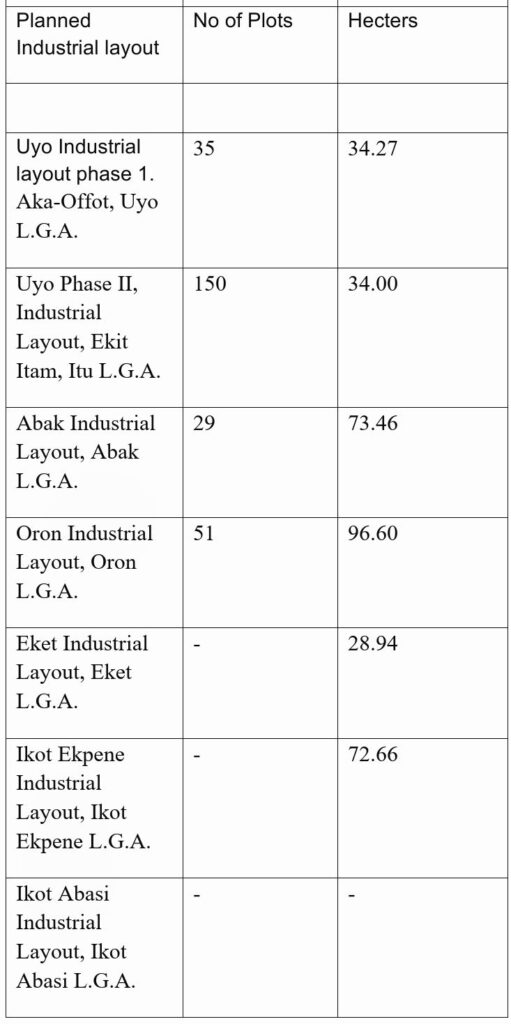
7. Establishment of Industrial Laboratory and Raw Material Display Centre: Alongside the existing research laboratory inherited from Cross River State, additional facilities were built to host the Federal Raw Material Research Council and a display center. The laboratory’s purpose was to explore local raw materials for industrial development.
8. Financial Advisory Studies: The government commissioned studies to assess ailing industries with the intention of privatizing them.
9. Feasibility Studies: An investment of 2.4 million Naira was made to produce 29bankable feasibility studies focused on small and medium-scale industries.
10. Industrial Promotion Forum: To raise awareness and provide information on industrial development opportunities, the government organized forums and outreach programs. These efforts were aimed at educating and supporting grassroots entrepreneurs, with the Zonal Office providing technical and managerial services to SMEs.
The government’s efforts during this period, as documented in “The March to Progress, 1987-1991, highlighted significant achievements in industrial development and economic planning within Akwa Ibom State.
During this tenure, several initiatives were launched to strengthen the industrial and economic landscape of Akwa Ibom State. One of the key milestones was the establishment of Akwa Feeds Limited, a company dedicated to producing high-quality livestock feeds. This initiative aimed to significantly enhance the livestock industry within the state.
In addition, the state government implemented the Privatisation and Commercialisation Edict and established the Akwa Ibom Technical Committee on Privatisation and Commercialisation. This was a strategic move towards fostering a more efficient and commercially driven economy.
Champion Breweries Limited in Uyo, which had faced several challenges, was revitalized with an investment of 20 million Naira. The state government played a crucial role by contributing 11.7 million Naira to this effort, ensuring the brewery’s return to full operation.
The physical planning and design of Uyo Phase II layout were successfully completed, marking a significant step forward in urban development. Alongside this, we commenced and completed the engineering design for water and electricity distribution lines in Uyo (Phase I), as well as in the industrial estates of Abak and Oron. Plans for further development of other estates are currently underway.
Another major achievement was the construction of the Raw Material Display Centre building, which was further equipped with state-of-the-art facilities. This center is a cornerstone in our efforts to promote local resources and industries.
Moreover, in line with the federal government’s “Work for Yourself” program, we facilitated the launch of four out of the 26 projects designed to empower our citizens with self-employment opportunities.
In September 1991, the Commissioner for Industries and Cooperatives, Prof. Joe Umo, emphasized the administration’s commitment to rapid industrialization. The statement highlighted our dedication to achieving accelerated industrial growth, which is seen as the backbone of Akwa Ibom’s economy. To meet these goals, the Ministry of Industries and Cooperatives was restructured into four specialized departments: Industrial Research and Development, Small and Medium Scale Industries, Cooperative Services, and Personnel and Finance.
Significant progress was made in the Department of Industrial Research and Development within the first year, including the purchase of equipment for the Raw Materials Display Centre in Uyo and the completion of a limestone investigation in Ikono. We also successfully hosted an executive workshop for the boards of directors and committees of government-owned companies and parastatals.
Contracts were awarded for financial and advisory studies to revive key industries such as Sunshine Batteries, Asbestonit Limited, Qua Steel Products Limited, and Plasto Crown Limited. These efforts were part of our broader strategy to rejuvenate the state’s industrial sector.
The Department of Small and Medium Scale Industries also made notable strides. We completed 19 feasibility studies on various industries, ranging from fish processing to pharmaceutical plants. Additionally, 10 more projects were commissioned for feasibility studies, including lead pencil production, ice block manufacturing, and tyre retreading. The department also published the Akwa Ibom State Industrial Directory and Investors’ Guide and successfully hosted an industrial promotion forum, which resulted in a 4.5 million Naira loan guarantee for 28 small and medium-scale projects.
A government publication titled “The Mirror” reflected our approach to industrial development. The state’s industrial policy emphasized a supportive role where the government provided the necessary infrastructure and initiatives, while the private sector took the lead in driving economic growth. This policy was exemplified by our efforts to reactivate struggling industries and establish new ones, thereby strengthening the state’s economic foundation.
The government also took proactive steps to attract genuine investors by offering a package of incentives, including the provision of essential services like water, electricity, and telephone lines. We simplified the process of plot allocation, constructed factory buildings for investors to rent, and guaranteed loans for the establishment or revitalization of industries.
During Navy Captain Adeusi’s administration, and under the leadership of the Commissioner for Industry, Commerce, and Tourism, Mr. Eno Udo Ekong, the focus remained on reviving ailing industries. The administration targeted three industries for immediate reactivation, and significant progress was made in negotiations with West African Battery, an Ibadan-based company, to form a technical partnership for the revitalization of Exide Battery production in the state. Key management staff were recalled to collaborate closely with these technical partners and financial advisors.
Finally, an analysis of budgetary allocations between 1987 and 1999 revealed a significant boost for the industrial sub-sector in 1998. The government also established the State Development Trust Fund, designed to provide microcredit facilities to support small and medium-scale investors, further demonstrating our commitment to industrial and economic development in Akwa Ibom State.
INDUSTRIALIZATION IN AKWA IBOM STATE UNDER GOVERNOR ATTAH TILL UDOM EMMANUEL
When Arc. (Obong) Victor Attah took office as the second civilian Governor of Akwa Ibom State on May 29th, 1999, he made industrialization a cornerstone of his administration. He outlined a comprehensive plan focused on reviving existing industries, fostering partnerships with both local and international technical partners, and exploring innovative linkages to maximize resources. His vision also included the establishment of industrial parks to optimize space and ensure the provision of necessary infrastructure, all aimed at creating an enabling environment that would attract private sector investment in industrial development.
Governor Attah was committed to promoting private sector-led industrialization, which encompassed everything from cottage and medium-scale enterprises to large-scale industries. To drive this initiative, the Akwa Ibom Industrial and Investment Council (AKIPOC) was established. This body was tasked with industrial promotion, investment facilitation, project management, privatization, and human capital development, leveraging the state’s abundant human and natural resources.
To further these industrialization efforts, Governor Attah embarked on an economic tour of the United States, seeking technical and financial partners for the revival of ailing industries.
This tour laid the groundwork for the establishment of industrial estates in Uyo, Ikot Abasi, and Essien Udim, backed by a government fund of 100 million Naira to support private sector initiatives. Additionally, a poverty alleviation agency was established in collaboration with the UNDP and other agencies to offer soft loans to entrepreneurs, thus fostering job creation and entrepreneurship development.
One of the notable successes of the Attah administration was securing a core investor for Champion Breweries, which led to the resumption of production and the creation of hundreds of jobs.
Following his economic tour, the administration also attracted investors from the United States, Scotland, and Canada interested in setting up a private export-oriented refinery, a gas turbine plant, and a power distribution company. A significant achievement was the reactivation of Plasto-Crown Nigeria Limited in Uyo, supported by a 30 million Naira soft loan, enabling the company to resume production of various plastic products, thereby contributing to the state’s economic growth.
Further plans included the establishment of roofing zinc, pharmaceutical, and starch production plants. The administration also invested in the Ibom Petrochemical and Refining Company, an adjunct to the Ibom Power Plant. This project was expected to catalyze an industrial boom in the state, given Akwa Ibom’s status as an oil-producing region. The proposed refinery aimed to produce a variety of petroleum products, and a consortium of banks had agreed to finance these ambitious projects.
The Attah administration also signed an agreement with the Chinese firm SINOPEACH to establish a refinery at Ikot Abasi, projected to refine 100,000 to 120,000 barrels of oil daily.
Additionally, the state partnered with private investors to establish the Amakpe Refinery in Eket, with a modular plant designed to refine 12,000 barrels of crude oil per day.
There were also plans for indigenous investors to collaborate with Aqua Solar Components of Barbados to establish a solar water heater manufacturing plant, further diversifying the state’s industrial portfolio. In November 2004, the state government, through Akwa Petroleum and Energy Limited (APEL), acquired the Stubbs Creek marginal oil and gas fields, marking another step towards industrial self-sufficiency.
The administration also took steps to address the state’s energy needs, recognizing that reliable electricity was crucial for industrialization. The Ibom Power Plant (IPP), located in the Ikot Abasi Free Trade Zone, was conceived as a solution to the state’s electricity shortages, with a capacity to generate 685 megawatts.
While Governor Godswill Akpabio, Attah’s successor, promised to establish at least one industry in each of the state’s 31 local government areas, this goal was not achieved during his tenure. However, the administration did focus on infrastructure, completing the airport project initiated by Attah and constructing various roads across the state.
Under the administration of Governor Udom Emmanuel, there was renewed focus on industrialization. Projects like the reactivation of Peacock Paint at Etinan, the establishment of a toothpick factory at Ekom Iman, and plans for coconut-related industries, meter manufacturing, and syringe production but what significance are these ones to the State currently, are they adding to the State revenue? Questions that needs to be asked. Additionally, the proposed Ibaka Deep Sea Port project has seen the commencement of critical infrastructure development, such as access roads, which hold the promise of creating jobs for the state’s youth.
THE IMPORTANCE OF INDUSTRIALIZATION IN DEVELOPMENT
Recognizing the current low level of industrial development, it is clear that government efforts must focus on setting strategic targets and implementing programs to address this issue.
ACHIEVING THESE GOALS WILL LEAD TO SEVERAL BENEFITS, INCLUDING:
1.A significant boost to the region’s GDP from the manufacturing sector.
2. An improvement in the standard of living and the overall economic stability of the area.
3. The rapid expansion, modernization, and diversification of the economy.
4. The creation of more employment opportunities, which would help absorb a larger portion of the workforce into modern manufacturing activities.
5. An increase in government revenue.
6. Rural development, including the provision of essential services such as water, electricity, health, and education facilities.
THE ROLE OF THE PRIVATE SECTOR IN INDUSTRIAL DEVELOPMENT
The economy of Akwa Ibom State is driven by both public and private sectors. The private sector, encompassing small and large businesses, plays a crucial role in industrial development. It involves the production of raw materials and finished goods, distribution, and the provision of various services that contribute to societal well-being.
The private sector in Akwa Ibom consists of a multitude of small and few large-scale industries. These initiatives have significantly complemented the government’s efforts in industrial development. Private enterprises operate in various sectors, including tailoring, bakery, electrical works, blacksmithing, carpentry, furniture making, printing, oil milling, pottery, weaving, leatherworks, and tinkering.
At the creation of Akwa Ibom State, several privately owned industries were prominent, such as Dr. Pepper Bottling Company in Eket, Ukot Bottling Company in Ikot Ekpene, and Uso Metal Construction Works in Ikot Ekpene, among others. Despite the establishment of additional small and medium-scale companies in recent years, the impact on employment opportunities remains limited.
INDUSTRIAL DEVELOPMENT STRATEGY FOR AKWA IBOM STATE
To drive industrial growth in Akwa Ibom State, the following strategies should be considered:
1. Harnessing the state’s human and natural resources to produce sufficient, quality, and essential goods and services for the people.
2. Sectoral programs should aim to encourage, protect, and attract foreign investment into the state.
3. Financial and other support should be provided to the private sector to establish and run small and medium-scale industrial enterprises. This includes strengthening the policy on revolving small/medium-scale loans.
4.Industries should be strategically located near raw material sources, with necessary infrastructure such as roads and power in place. Government policy should encourage research into the use of local raw materials, fostering self-reliant development.
5. Publicly owned industries should be fully commercialized, with management incentivized for profitability and penalized for losses to avoid a recurring setback.
6. Focus should be placed on industries that can thrive on agricultural products, particularly palm produce, as well as the oil and gas sector.
7. International best practices should be adopted in funding and forming partnerships within the industrial sector.
Again this article emphasizes both the challenges and the opportunities within Akwa Ibom State, making a compelling case for future industrial development supported by visual evidence of the state’s progress as it is shown below the pictures of infrastructure so far.
Akwa Ibom State, known for its rich cultural heritage and natural resources, once recorded several notable industries that were the pride of the region. In the past, however, many of these industries have experienced a decline, leaving behind a once thriving industrial hub. Despite these setbacks, Akwa Ibom remains a land of opportunity, with untapped potential and modern infrastructure evident that can pave the way for a revitalization in industrial development.
Decline of Early Industries: The state’s early industrial ventures, such as the Qua Steel Company and the Peacock Paints Industry, were beacons of hope for economic growth. These industries, among others, provided jobs, boosted local economies, and positioned Akwa Ibom as a key player in Nigeria’s industrial landscape. Unfortunately, mismanagement, inadequate funding, and policy inconsistencies led to the gradual decline and eventual closure of many of these industries, leaving behind a gap in the state’s industrial sector.
But despite the decline, Akwa Ibom is not without its opportunities, the state is blessed with abundant natural resources, including oil, gas, and agricultural produce, which can serve as the backbone for new industries. Additionally, the state’s strategic location, with access to both land and sea routes, makes it an ideal spot for investors looking to tap into the Nigerian and West African markets.
The future of Akwa Ibom’s industrial development lies in the state’s ability to attract and sustain investments. The government has already laid the groundwork with the development of modern infrastructure, such as the Ibom Deep Seaport and the Ibom Industrial City. These projects should be powered with improved road networks, power supply, and security, let’s make Akwa Ibom an attractive destination for both local and international investors.
While Akwa Ibom State may have lost some of its early industries, the potential for a brighter industrial future remains. With the right policies, investment in infrastructure, and a focus on sustainable development, Akwa Ibom can reclaim its position as an industrial hub of the nation. By showcasing the state’s beautiful landscapes, modern infrastructure, and investment friendly environment, there is a clear message to the world that Akwa Ibom is ready for business.
Accompanying this narrative are images that highlight the state’s transformation. These images showcase the architectural beauty of places like the Ibom Icon Five Star Hotel, the up-and-coming Four Points by Sheraton in Ikot Ekpene, and the serene, investor-friendly environments across the state. These visuals serve as a testament to Akwa Ibom’s readiness to embrace a new era of industrialization.
IN CONCLUSION
Industrialization is crucial for the growth and development of any society. Although the concept of industrialization in Akwa Ibom State predates its creation in 1987, the state inherited about 10 industrial establishments from the old Cross River State.
Unfortunately, most of these industries were already struggling, and the few that were operational gradually deteriorated until they became entirely dysfunctional. Several challenges, such as a shortage of essential imported raw materials, inadequate infrastructure, large debts to foreign technical partners, corrupt management practices, and an inability to generate sufficient foreign exchange for spare parts, contributed to this decline.
Over the years, various state administrations have attempted to revitalize the industrial sector by reactivating failing industries, pursuing privatization and commercialization efforts, and implementing related policies and programs. However, the state’s industrial journey has been marked by insecurity and a lack of consistent commitment from the government.
Many well-conceived programs and projects, such as the raw material display center, feasibility studies, and research initiated by one administration or a Commissioner in the Ministry of Industry were often abandoned by subsequent administrations. This inconsistency in planning has led to significant setbacks. Additionally, existing documents on the sector reveal that new administrations often claim credit for projects initiated by their predecessors, creating further disruption.
The pace of industrialization in Akwa Ibom State was slow between 1987 and 1999, a period that coincided with Nigeria’s return to democratic governance. The administration of Governor Victor Attah had a clear vision for the state’s industrial direction, if his successors had made a do- or- die effort in realizing these ideas the State would have gone far in Industrialization. The immediate past administration tried to revitalize the industrialization plan, albeit with some noticeable shortcomings.
Moving forward, it is hoped that the agenda will be pursued in alignment with international best practices, where the government’s role in managing industries is minimized completely as it is noticed not to be the best practice. Additionally, it is essential to establish medium- and long-term programs to guide the sector, ensuring that individual managers do not interfere with the overarching plan.
Most importantly, the current administration could benefit greatly from revisiting the original industrialization blueprint designed by previous administrations, which could provide a more cohesive and effective approach to the state’s industrial development.
If these modern infrastructures so far seen in the State met with the old industries, imagine the boom in revenue generation and employment level in the State.
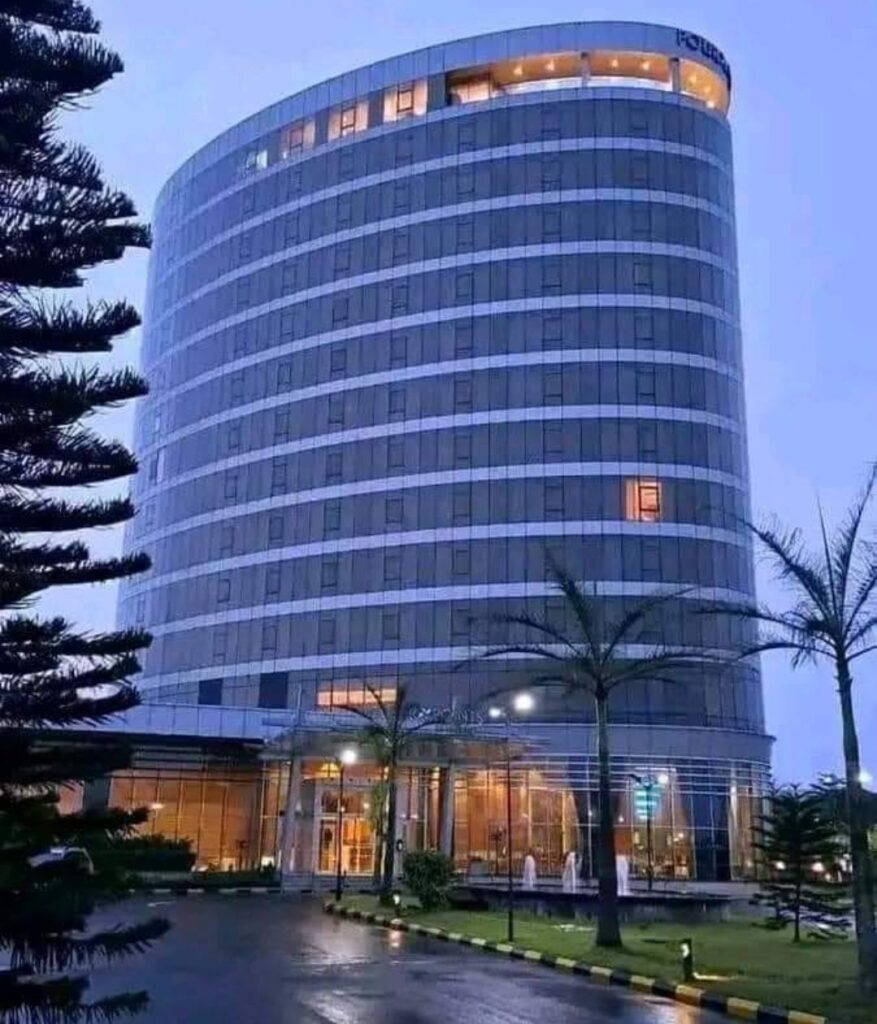

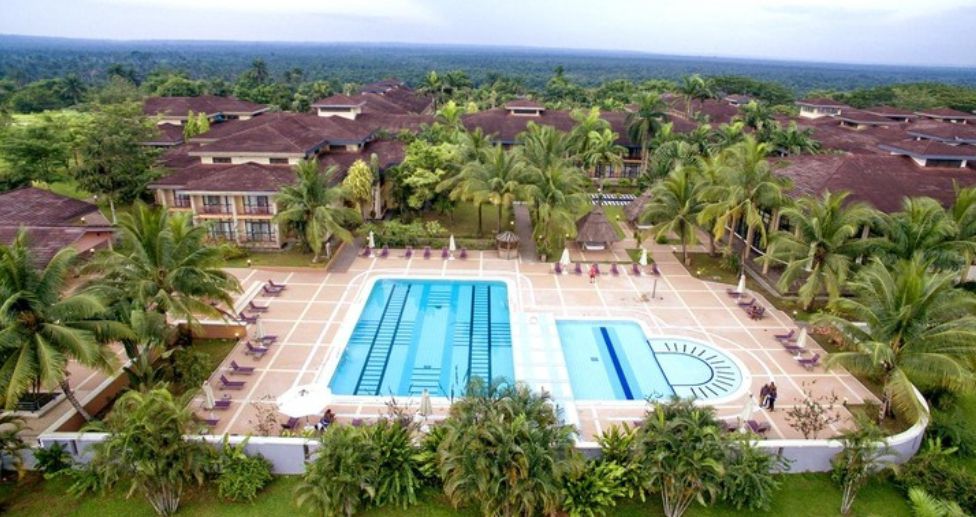

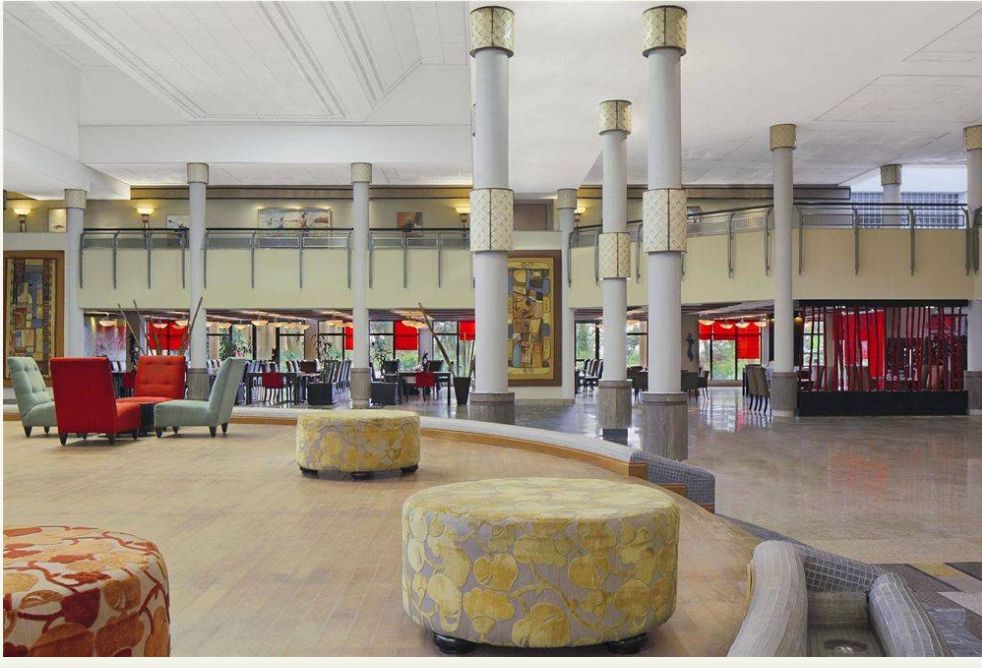
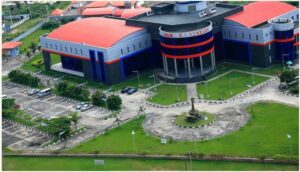
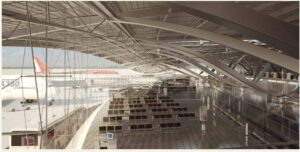
A gateway to the world – The new terminal at Victor Attah International Airport, redefining modern travel in Akwa Ibom State.
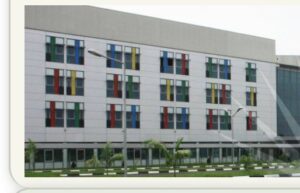
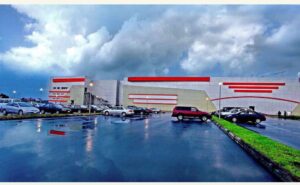
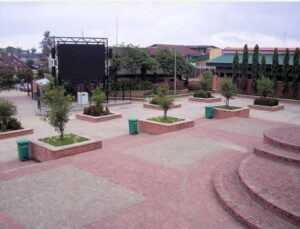
Emphasizes the plaza as a beloved space for locals and visitors alike.

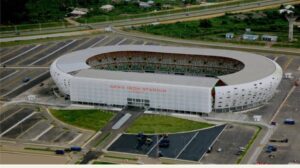
Nigeria’s crown jewel of sports The Godswill Akpabio International Stadium, an architectural masterpiece and a symbol of excellence.

Serenity at its finest the endless shores of Ibeno Beach, where nature meets tranquility.
Your comments and reviews will be highly appreciated. Check out the comment section.
Follow Globaltrust.ng for more stories.


